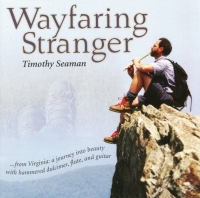|
Album Liner Notes 1. Samhradh, Samhradh --- This evocative Gaelic air is “Summertime, Summertime.” I learned it from a mysterious Chieftains rendition --- and it assumed its flowing new ways during recording. 2. She’s Like the Swallow --- A gem from Newfoundland. 3. Wayfaring Stranger/Wade in the Water --- Both of these spirituals are found in African-American lore; “Wayfaring Stranger” is also in the Anglo tradition shape-note hymnals, a testimony to the shared roots of those who look to Heaven as home. I am a poor wayfaring stranger I’m going there to see my Savior, 4. Pretty Saro --- Folklorist Cecil Sharp found this simple yet profound tune on both sides of the sea. 5. Hatikvah --- Smetana used this old theme in the symphonic poem “The Moldau”; Israel has made it their national anthem, “The Hope.” To the memory of pianist Artur Rubinstein. So long as still within our breasts the Jewish heart beats true... 6. Ash Grove --- “Llewellyn On”, a very pure fruit of the Welsh singing tradition. The strife is o’er, the battle done; The powers of death have done their worst, The three sad days have quickly sped, Lord, by the stripes which wounded thee, 7. The Arran Boat --- learned from John and Phil Cunningham; Arran is a Scottish island. Far from mortal cares retreating, sordid hopes and vain desires --- Skye Boat Song --- Skye is another Scots isle. This beautiful air from our childhoods is dedicated to the memory of Rowena’s father, Benson Tucker. Logan Water --- a Robert Burns air lamenting the separations of war: O wae upon you, Men o’ State, that brethren rouse in deadly hate! In shape-note books the tune is called “Separation”: Submit to all the ways of God and walk the narrow happy road. 8. Timberline Wander --- a free dulcimer solo celebrating high open ridges such as those in Grayson Highlands State Park and on Mount Rogers. © T. Seaman, 1995 9. A Red, Red Rose --- Robert Burns’ great Scots air (1796): Till a’ the seas gang dry, my dear, And fare thee weel, my only luve, Londonderry Air --- The classic Irish harpers’ air, said to have been brought from the land of fairies. 10. Mahogany Lilt --- Mahogany dulcimer and mahogany guitar dance together. © T. Seaman, 1995 11. Jesu, Meine Freude --- an ancient German melody: first, my transcription for flutes from Bach’s motet setting of 1723; then a thoughtful piano fantasia built by Paulette Murphy on J. Cruger’s version. Banished is our sadness! Still have peace within. Amazing Grace --- In shape-note hymnals this American tune --- probably originally from Britain --- is called “New Britain”, and was first published in 1831 in Winchester in Virginia Harmony. The version here owes its inspiration to flutist Hubert Laws. Among John Newton’s less known verses: Yes, when this flesh and heart shall fail, The earth shall soon dissolve like snow, 12. The Happy Wanderer --- a tribute to Philmont Scout Ranch, Cimarron, New Mexico, where I wandered the mountain track for five joyous summers. ©F.W. Moeller and Antonia Ridge, 1954, 1982 I love to go a-wandering O may I go a-wandering 13. America the Beautiful --- In this September 2001 we particularly appreciate the full four verses of Katherine Lee Bates’s poem! Music by Samuel A. Ward. |
| MAIN | SONG LIST | LINER NOTES | BUY MUSIC |
 Wayfaring Stranger (1995, 2001)
Wayfaring Stranger (1995, 2001)